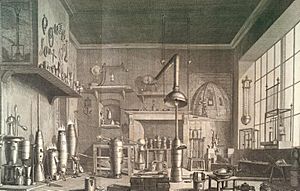William Lewis (scientist) facts for kids
William Lewis (around 1708 – 1781) was a British scientist. He was a chemist and also worked as a doctor. He is famous for his books about medicine and how to make medicines. He also did important research on metals.
Life and Work
William Lewis was born in Richmond, Surrey, England. His father, John Lewis, was a brewer. William went to Christ Church, Oxford University in 1730. He studied hard and earned several degrees there. He became a Bachelor of Arts in 1734 and a Master of Arts in 1737. Later, he earned degrees in medicine, becoming a Bachelor of Medicine in 1741 and a Doctor of Medicine in 1745. He worked as a doctor. In 1746, he lived in Dover Street, London. Soon after, he moved to Kingston upon Thames. In 1749, William Lewis gave a speech at the opening of the Radcliffe Library. He passed away in Kingston, Surrey on January 21, 1781. He was buried in Richmond.
Honours and Awards
William Lewis received several important honours for his scientific work.
- He became a Fellow of the Royal Society in 1745. This means he was chosen to be a member of a very old and respected scientific group in the United Kingdom.
- He won the Copley Medal in 1754. This is a very important science award. He received it for his many experiments on a metal called Platina. His work helped scientists learn how to tell if gold was mixed with other metals. He had to stop his research because he ran out of materials.
Key Scientific Work
William Lewis wrote several important books about chemistry and medicine. These books helped other scientists and doctors learn more. He also translated chemical books by other scientists, like Caspar Neumann. From 1754 to 1757, he published a series of scientific papers about platinum. These papers were published in the Philosophical Transactions of the Royal Society. In 1767, a group called the Society for the Improvement of Arts, Manufactures, &c. gave him a gold medal. He earned this for an essay he wrote about 'potashes', which are important chemicals used in many industries.
 | Aaron Henry |
 | T. R. M. Howard |
 | Jesse Jackson |


